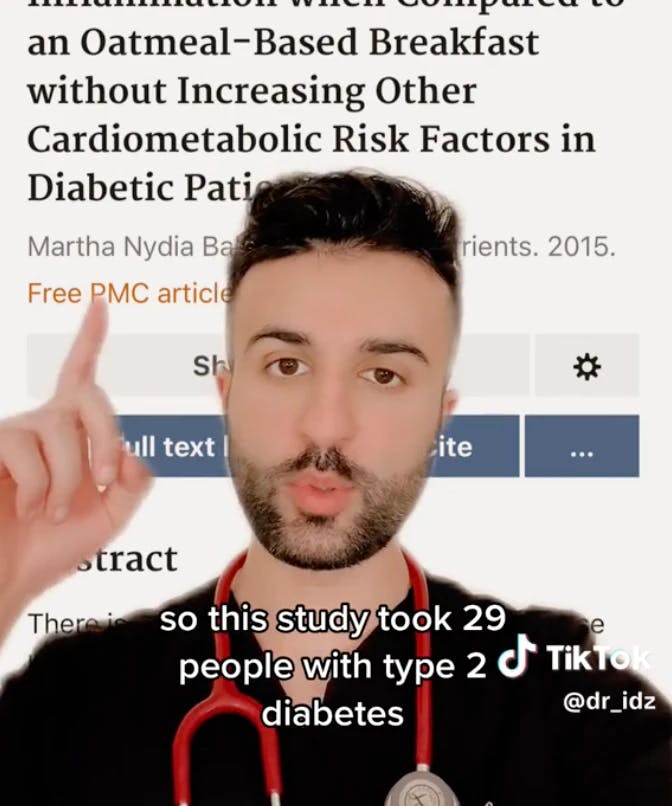Are Oats Really Bad For You? A Doctor On TikTok Debunks A Study Used To Bash Oats
Some of the most viral health content online is about how oats are a fake health food that do much more harm than good to your body. But this doctor's viral TikTok wants you to think twice before believing that.

In recent years, the humble oat has ascended the ranks in the world of nutrition, lauded as a superfood for its impressive health benefits. A staple in many diets, oats have gained popularity for their versatility, affordability, and the numerous ways they can be incorporated into daily meals. First, we were told that oats are a nutrient powerhouse, packed with essential vitamins, minerals, and antioxidants. They are particularly rich in B vitamins, magnesium, and iron. High in fiber, particularly beta-glucan, oats aid digestion, help in maintaining bowel health, and can significantly reduce LDL cholesterol, commonly known as "bad" cholesterol.
One of the most important attributes of oats is their high content of complex carbohydrates, which provide a sustained release of energy. This makes oats an excellent breakfast choice, keeping you satiated and energized throughout the day. Moreover, the inclusion of oats in a diet can help regulate blood sugar levels, making them a beneficial food for individuals with diabetes. We were told by experts that oatmeal is essential to every healthy diet. However, the most recent viral health content on social media suggests otherwise.
Some Health Experts Claim Oats Are Bad for You
We've recently seen a movement that pushes back against mainstream nutrition advice and encourages people to break free from the dietary instructions we have been given by the medical system that is heavily influenced by Big Pharma. All in all, this has been positive. People are encouraged to steer clear of processed and packaged foods, prioritize high-quality animal products, not be afraid of healthy fats that come in grass-fed butter, avocado, and coconut oil, etc. We've also been warned to either minimize or get rid of processed grains, which has led to many new health experts advising against eating oats.
Paul Saladino, better known as Carnivore MD on social media, promotes an animal-based diet that is even free from vegetables, which he claims have defensive chemicals that wreak havoc on our digestive system. He often instructs his followers not to eat oats because they're not the breakfast of champions, as we have been told previously. In a recent Instagram reel, he says oats are full of phytic acid, which bites onto minerals like magnesium, zinc, calcium, and iron, preventing you from absorbing them and thus robbing you of nutrients. He claims that oatmeal is the last type of breakfast that you should eat, calling it a fake health food.
Other experts say that oatmeal is high in calories and can be too large a serving of carbs, which is particularly important if you're pre-diabetic. Another TikTok shows a clip from a podcast in which a health expert talks about oats being mostly starch with not much protein, meaning you get an unwanted glucose spike, which means you give your body an unnecessary "sugar-high." But Dr. Idz, a medical doctor and nutrition researcher, made a TikTok responding to this claim.
Doctor on TikTok Debunks a Study Claiming That Oats Are Bad for You
The woman on TikTok highlighted a study that reviewed two groups of people, all of whom had diabetes. One group ate 40 grams of oatmeal for breakfast every day for five weeks, and the other ate one egg. Then they switched breakfasts for another five weeks. The woman says that as soon as they started eating an egg instead of oatmeal, all their inflammation markers went down, as did their risk for heart disease.
But Dr. Idz says that's not exactly what the study says. He found the study, read through it, and said there was "no difference in weight, fat, blood pressure, lipids, HbA1c, insulin, and C reactive protein, being the main inflammatory marker, so no, heart disease risk did not go down." The research did show, however, that one inflammatory marker was lower on the egg diet, and that was TNF-a.
"They didn't take a baseline TNF-a, so both could have reduced it, but maybe eggs reduced it slightly more," he said. But we can't know for sure because there wasn't any previous data to compare it to.
"When you compare this to other research, oats reduced CRP and interleukin-6 in those with dyslipidemia," Dr. Idz continued. He also cites other meta-analysis studies showing that "oats are even beneficial in type 2 diabetes by improving their hb1ca, fasting glucose, and blood lipids."
Oats may not be the most protein-rich breakfast, but there are always ways to add more protein to the first meal of your day. There are plenty of other reasons why people might try to avoid oats; maybe you prefer to eat gluten-free, or you are trying to avoid grains for digestive reasons. But this study still doesn't necessarily prove that oats are inflammatory compared to eggs.